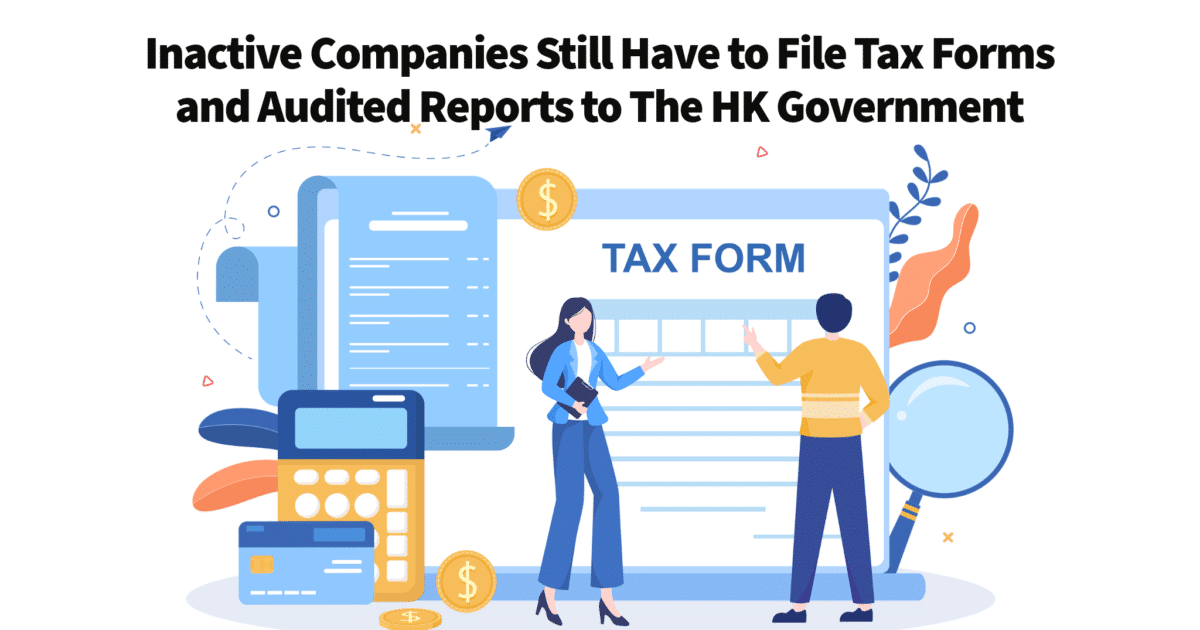According to the Inland Revenue Department (IRD), every registered company in Hong Kong must file a profit tax return form and audited report every financial year. There was a common misconception that people thought small to medium enterprises (companies with annual revenue of less than HKD$2 million) were only required to file a profit tax return form and no need to turn in an audited report. However, the government never stated that SME owners did not need to submit an audited report. It was more like they could submit the audited report at a later date because the government did not want to spend too many resources on scrutinizing every SME there is since there are so many registered companies here in Hong Kong. This article will provide information on the general requirement to file a tax form and what to look out for when submitting an audited report.
Inactive Companies
As for inactive companies, company directors are still required to submit a profit tax return form and an audited report to the government every financial year. Similar to SMEs, some people had a general misconception thinking that inactive companies only had to turn in the tax form but not the audited report. In fact, the Hong Kong government updated the rules and regulations in regard to tax filing in April 2023 stating that every registered company in Hong Kong must submit a tax form and audit report in each financial year whether it is active or inactive.
Profit Tax Return Filing
For your first-time filing profit tax return, the Hong Kong government tends to be more lenient as to when you can submit your tax form and audit report the latest possible. One usually gets an extra 2 months of grace period for final submission (usually 3 months after the issue date), please refer to the date printed on the tax form.
So, what does a tax form normally consist of? For inactive companies, one should declare “zero” for the three major categories: the assessable profits (before loss brought forward), the adjusted loss (before loss brought forward), and the loss brought forward from the prior year. In terms of tax liability or repayment, one should also declare “zero” for both tax payable and tax repayable. Long story short, one can select” no” and “zero” except for certain sections which would depend on the final audited report and profit tax computation generated by your auditor.
Audit Report Preparation
Aside from company formation, we are also a professional accounting firm with a long history in Hong Kong. Keep in mind that IRD will send out your first tax form 18 months after your company is incorporated. As your service provider, we recommend you start gathering supporting documents (bank statements, invoices, and expense receipts) as soon as your company is incorporated and send them to us at least 3 months before the first tax form is sent out.
Who is Qualified?
Our auditors will review your supporting documents and then determine whether your company is eligible to claim 0% offshore status. If you are eligible, they will simply state the facts on the report because the offshore status is based on the matter-of-fact principle. The audit report can be completed remotely. Once our auditors have prepared the draft, they will send it to you via email. All you need to do is to review it before printing it out and signing it, then mailing the documents to us back in Hong Kong because the documents must be physically signed by the company director.
The government only accepts audited reports completed and signed by a practising Hong Kong certified public accountant (HKCPA). Not to mention, a certified public accountant does not necessarily mean he or she is qualified to complete an audit report. A practicing CPA has a higher qualification compared with a regular accountant because one is required to go through exams to be recognized. Only practicing CPAs are allowed to sign the audit report.
In terms of accounting, one can generate a management account (balance sheet, profit & loss report, general ledger) as long as one has an accounting background even if he or she isn’t a professional accountant since auditing and accounting are two completely different things.
This concludes the topic, and we hope you all gain some insights into the rules and regulations of profit taxation in Hong Kong. If you are interested in incorporating a company or need accounting services in Hong Kong, please feel free to contact us by email at info@cheapincorp.com or WhatsApp at +852 5404 0902.
